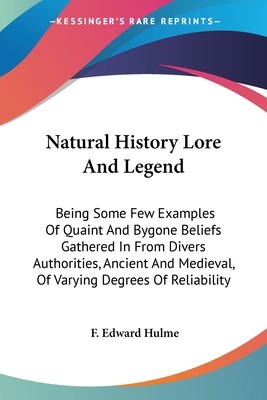
- We will send in 10–14 business days.
- Author: F Edward Hulme
- Publisher: Kessinger Publishing
- ISBN-10: 1428626646
- ISBN-13: 9781428626645
- Format: 15.2 x 22.9 x 2.1 cm, minkšti viršeliai
- Language: English
- SAVE -10% with code: EXTRA
Reviews
Description
Excerpt from Natural History, Lore and Legend: Being Some Few Examples of Quaint and by-Gone Beliefs, Gathered in From Divers Authorities, Ancient and Mediaeval, of Varying Degrees of Reliability
Mediaeval naturalists honest searchers after truth - Sir Emerson Tennant thereupon - Recent discoveries confirm many statements once contested - "Travellers' tales" - Mediaeval natural history largely based upon ancient - Difference of aim between modern and ancient and mediaeval nature-study - The moral treatment - Illustrations from the "Speculum Mundi" - Falsification of natural facts justified by the ecclesiastics - Ready credulity a mediaeval characteristic - Two examples thereof - The love of the marvellous - Astrological influences - The mental equipment of a mediaeval surgeon - Quaint book titles - The unchanging East - Suttee, Juggernaut, &c.in the pages of mediaeval writers - The "Mirabilia descripta" of Bishop Jordanus - The "Voiage and Travaile" of Maundevile - The coca plant - Burton's "Miracles of Art and Nature" - The "Historia Mundi" of Pliny - English editions of it - Herodotus - The writings of Aristotle - The sources of information in the Middle Ages - The praise of books - Books of travel Munster's "Cosmography" - The interest and beauty of old title-pages - Elephants in lieu of towns in the old maps - A tale of a tub - Herbert's Some Yeares Travels into Africa and Asia the Great" - The travels of Marco Polo - Greography of Peter Heylyn - Raleigh's, Hakluyt s, Purchas', Strays', Acosta's books of travels - Medical books - Potter's "Booke of Physicke" - Cogan's "Haven of Health" - Indifference to animal suffering - "Bestiare Divin" of Guillaume - The "Bestiary" of Philip de Thaun - The Armories of Guillim, Legh, and Bossewell.
EXTRA 10 % discount with code: EXTRA
The promotion ends in 22d.02:57:20
The discount code is valid when purchasing from 10 €. Discounts do not stack.
- Author: F Edward Hulme
- Publisher: Kessinger Publishing
- ISBN-10: 1428626646
- ISBN-13: 9781428626645
- Format: 15.2 x 22.9 x 2.1 cm, minkšti viršeliai
- Language: English English
Excerpt from Natural History, Lore and Legend: Being Some Few Examples of Quaint and by-Gone Beliefs, Gathered in From Divers Authorities, Ancient and Mediaeval, of Varying Degrees of Reliability
Mediaeval naturalists honest searchers after truth - Sir Emerson Tennant thereupon - Recent discoveries confirm many statements once contested - "Travellers' tales" - Mediaeval natural history largely based upon ancient - Difference of aim between modern and ancient and mediaeval nature-study - The moral treatment - Illustrations from the "Speculum Mundi" - Falsification of natural facts justified by the ecclesiastics - Ready credulity a mediaeval characteristic - Two examples thereof - The love of the marvellous - Astrological influences - The mental equipment of a mediaeval surgeon - Quaint book titles - The unchanging East - Suttee, Juggernaut, &c.in the pages of mediaeval writers - The "Mirabilia descripta" of Bishop Jordanus - The "Voiage and Travaile" of Maundevile - The coca plant - Burton's "Miracles of Art and Nature" - The "Historia Mundi" of Pliny - English editions of it - Herodotus - The writings of Aristotle - The sources of information in the Middle Ages - The praise of books - Books of travel Munster's "Cosmography" - The interest and beauty of old title-pages - Elephants in lieu of towns in the old maps - A tale of a tub - Herbert's Some Yeares Travels into Africa and Asia the Great" - The travels of Marco Polo - Greography of Peter Heylyn - Raleigh's, Hakluyt s, Purchas', Strays', Acosta's books of travels - Medical books - Potter's "Booke of Physicke" - Cogan's "Haven of Health" - Indifference to animal suffering - "Bestiare Divin" of Guillaume - The "Bestiary" of Philip de Thaun - The Armories of Guillim, Legh, and Bossewell.


Reviews